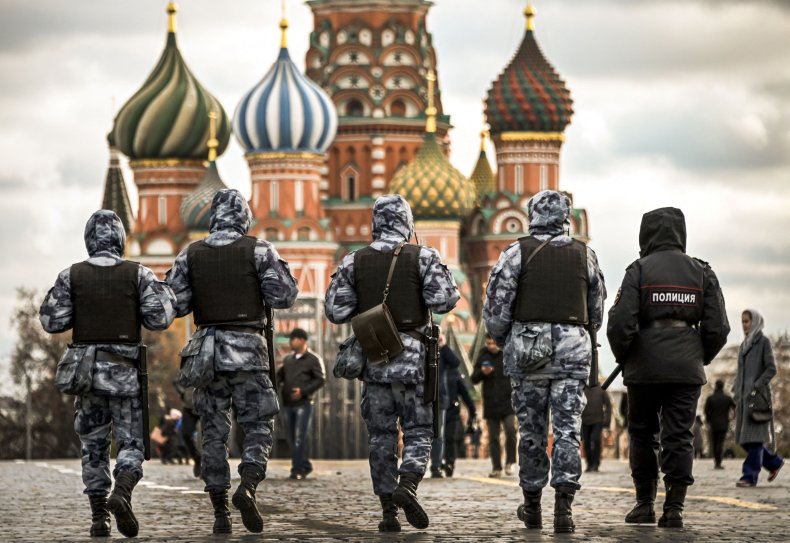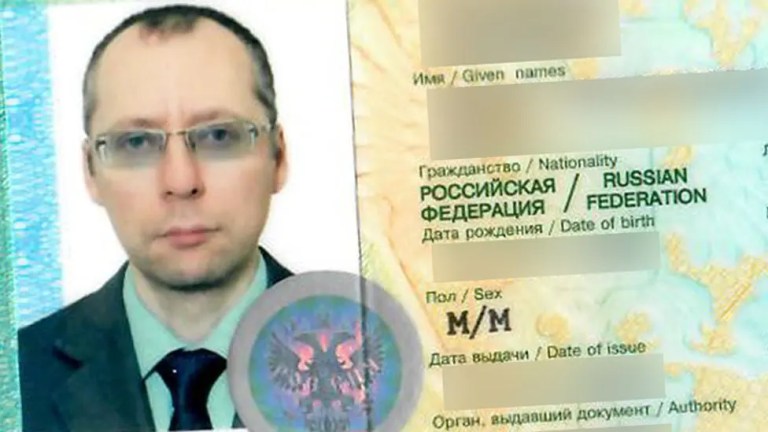
Cases Involving Rosgvardia (Putin’s Private Army)
Are Clearest Sign Yet of Dissent in Russian Ranks
Pjotr Sauer and Andrew Roth / The Guardian
(May 27, 2022) — More than 100 Russian national guardsmen have been fired for refusing to fight in Ukraine, court documents show, in what looks to be the clearest indication yet of dissent among some parts of security forces over Moscow’s invasion of Ukraine.
The cases of the 115 national guardsmen, a force also known as Rosgvardia, came to light on Wednesday, after a local Russian court rejected their collective lawsuit that challenged their earlier sacking.
According to the court’s decision, published on its website, the lawsuit was dismissed after the judge determined that the soldiers had been rightfully fired for “refusing to perform an official assignment” to fight in Ukraine and instead returned to a duty station.
The appeal took place in Nalchik, the capital of the Kabardino-Balkarian republic in the Russian Caucasus, where the unit is based.
Since Moscow’s invasion of neighbouring Ukraine, its military has reportedly been plagued by poor morale, with reports of soldiers claiming they did not know they were going to war until they crossed into Ukraine.
The Pentagon said this month that it had seen “anecdotal reports” that “mid-grade officers at various levels, even up to the battalion level”, had “either refused to obey orders” or were not obeying them with the expected measure of “alacrity”.
Andrei Sabinin, the lawyer who represented the 115 soldiers, said the court’s decision was “unprecedentedly quick” given the complexity of the case.
“I express doubts about the fairness of the process as a whole because my clients were denied to call up certain witnesses and several documents were rejected by the court.”
According to Sabinin, the commanders of the Rosgvardia unit offered the soldiers the option not to fight and their dismissal was illegal.
Russia created Rosgvardia, a militarised force separate from the army, in 2016 to fight terrorism and maintain public order. Since its inception, members of Rosgvardia, which is often referred to as Vladimir Putin’s “private army”, have mostly been involved in crackdowns on peaceful anti-government protests.
Military analysts have linked Russia’s heavy use of Rosgvardia soldiers in Ukraine to Moscow’s strategic aims of capturing and holding major Ukrainian cities, including Kharkiv and the capital, Kyiv. These plans failed, while Rosgvardia units suffered heavy casualties after Ukrainian cities remained battlegrounds rather than being captured by Russia, which left Rosgvardia units exposed to Ukrainian attacks.

Members of Rosgcardia rehearsing for military parade.
Documents acquired by the Guardian on Friday from a separate criminal case against a Siberian journalist further reveal Rosgvardia’s role in Ukraine.
Mikhail Afanasyev, the chief editor of Novy Fokus in the Russian region of Khakassia, was arrested by security forces last month over the website’s reporting on a separate Rosgvardia unit that also refused deployment to Ukraine.
Court testimonies given by members of the Rosgvardia unit mentioned in Afanasyev’s reporting confirm earlier reports that 11 Rosgvardia from Khakassia refused to fight.
The testimonies also give weight to suggestions that the Kremlin’s invasion of Ukraine was intended initially as a blitzkrieg attack on Kyiv with the aim of capturing the capital.
In one testimony, a Roskgvardia soldier told the court that his commander instructed his unit three days prior to the invasion that they would be sent to Ukraine to “patrol the streets and intersections of Kyiv”.
“The commander explained that all employees of the national guard and the Russian armed forces were assigned specific tasks during the special operation in Ukraine. The task of our detachment and for all the other detachments that were stationed with us was to guard the streets and intersections of Kyiv,” said the testimony, seen by the Guardian.
The content of the court documents was first reported by the regional independent outlet Tayga.info.
A month into the war, Moscow was forced to switch its offensive to more limited objectives after running into fierce Ukrainian resistance, with the army prioritising what it calls the “liberation” of the Donbas region.
But despite a recent string of military successes in the Donbas, the Kremlin this week was confronted with two incidents of rare public dissent from Russian officials.

Diplomat Boris Bondarev resigned over Ukraine invasion.
On Wednesday, Boris Bondarev, a career diplomat posted to the Russian mission to the UN in Geneva, became the highest-level Russian diplomat to denounce the war, publishing a scathing letter in which he wrote that he was “ashamed” of his country and called the invasion a “disaster.” And on Friday, two communist lawmakers from the Khabarovsky Krai in the far east of Siberia urged Putin to end the Ukraine conflict.
“If our country does not halt the military operation then there will be even more orphans in our country,” lawmaker Leonid Vasyukevich said, according to a video of the meeting.
“During a military operation, people become disabled. These are young people who could be of great use to our country,” he added. “We demand an immediate withdrawal of the Russian troops.”
Posted in accordance with Title 17, Section 107, US Code, for noncommercial, educational purposes.
A Note from The Guardian
Russia’s invasion of Ukraine has abruptly transformed the world. Millions of people have already fled. A new Iron Curtain is grinding into place. An economic war deepens, as the military conflict escalates, civilian casualties rise and evidence of horrific war crimes mounts.
It’s our job at the Guardian to decipher a rapidly changing landscape, particularly when it involves a mounting refugee crisis and the risk of unthinkable escalation. Our correspondents are on the ground in Ukraine and throughout the globe delivering round-the-clock reporting and analysis during this perilous situation.
We know there is no substitute for being there — and we’ll stay on the ground, as we did during the 1917 Russian Revolution, the Ukrainian famine of the 1930s, the collapse of the Soviet Union in 1991 and the first Russo-Ukrainian conflict in 2014. We have an illustrious, 200-year history of reporting throughout Europe in times of upheaval, peace and everything in between. We won’t let up now.
Tens of millions have placed their trust in the Guardian’s fearless journalism since we started publishing 200 years ago, turning to us in moments of crisis, uncertainty, solidarity and hope. We’d like to invite you to join more than 1.5 million supporters from 180 countries who now power us financially — keeping us open to all, and fiercely independent.
Unlike many others, the Guardian has no shareholders and no billionaire owner. Just the determination and passion to deliver high-impact global reporting, always free from commercial or political influence. Reporting like this is vital to establish the facts: who is lying and who is telling the truth.
And we provide all this for free, for everyone to read. We do this because we believe in information equality. Greater numbers of people can keep track of the global events shaping our world, understand their impact on people and communities, and become inspired to take meaningful action. Millions can benefit from open access to quality, truthful news, regardless of their ability to pay for it. If there were ever a time to join us, it is now.